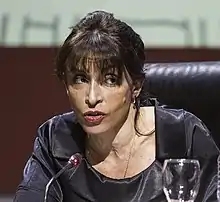Emilce Cuda
Emilce Cuda (born December 26, 1965) is an Argentine Roman Catholic social moral theologian and university professor.
Emilce Cuda | |
|---|---|
 People and Politics panel Oct 2015 | |
| Born | December 26, 1965 Buenos Aires, Argentina |
Notable work | Para Leer a Francisco |
| Theological work | |
| Tradition or movement | Theology of the People |
| Notable ideas | people-poor-worker (In Spanish, pueblo-pobre-trabajador) |
Dubbed “the woman who knows how to read Pope Francis”,[1] she is known for interpreting the teachings of Pope Francis through the Argentine Theology of the People,[2] political philosophers, and her own native exposure to Pope Francis’ cultural milieu.
She is the first Argentine lay woman to receive a pontifical PhD in moral theology.[3]
Education
She obtained her BA (1990), MA (2005) and PhD/STD (2010) from the Pontificia Universidad Católica Argentina, UCA. She studied philosophy at Universidad de Buenos Aires, UBA. She received an MBA (2001) from the Universidad de Ciencias Empresariales y Sociales.
Work
She collaborated closely with her two principal referents, Juan Carlos Scannone SJ and Ernesto Laclau. She traveled extensively in joint speaking tours with Scannone throughout Latin America, the United States, Europe and China. She joined Laclau at Northwestern University in 2016 to examine populism.
She is a professor at Universidad Nacional Arturo Juaretche, at the UCA in the Theology Faculty in social doctrine and at the UBA in philosophy. She was a visiting researcher in residence at Boston College (2016)[4] and DePaul University (2019).[5] She participates in numerous organizations and associations, including the Episcopal Conference of Latin America,[6] the Latin American Council of Social Sciences and Catholic Theological Ethics in the World Church.[7] She is an advisor to the Argentine Episcopal Conference[8] and the Pastoral Juvenil de la Arquidiócesis de Los Angeles. She is a visible figure in Argentine labor organizations.
She appears frequently at conferences and on-line panel discussions, speaking chiefly on labor issues and the economy of Francis[9][10][11]Her approach seems to draw on the social Papal encyclicals, Catholic cultural and intellectual history, philosophers of the left, and Argentine elements such as Peronism and tango lyrics.
Her formulation ‘pueblo-pobre-trabajador’ does not render directly into English, in which people and poor are not the connotative singular nouns that they are in Spanish.[12] Resonating with Pope Francis’s phrase “God’s holy faithful people”[13] and the preferential option for the poor of Catholic social teaching, Cuda’s phrase suggests that the poor, destitute as they may be, are the workers who make up the people on whom God’s favor rests.
Para Leer a Francisco - Reading Francis
Reading Francis – Theology, Ethics and Politics (Spanish: Para Leer a Francisco – Teologia, Etica y Politica) was published in 2014. Prefaced by Scannone, it examines the theological and philosophical underpinnings of Pope Francis’ writings. Spanish newspaper ABC wrote, "It allows us to delve into the main lines of Theology of the People, covering the pastoral and ethical implications of the decisions approved by the Latin American episcopate held in Aparecida."[14]
Books published
- Democracia y Catolicismo en Estados Unidos: 1792-1945. Democracy and Catholicism in the United States. (ISBN 978-9876401173) PhD thesis. 2010. In Spanish.
- Democracia en el Magisterio Pontificio. Democracy in the Pontifical Magisterium. (ISBN 978-9876403139) Masters thesis. 2014. In Spanish.
- Para leer a Francisco. Teología, ética y política. Reading Francis. (ISBN 978-9875002180) 2016. In Spanish. Translated into Italian in 2018.
- Nuevos Estilos Sindicales en América Latina y el Caribe. (Editor). New Styles of Labor Unions in Latin America. (ISBN 978-987-722-227-2). 2016. In Spanish.
- Hacia una ética de la participación y la esperanza. (Editor) Toward an Ethic of Participation and Hope. Prologue by James Keenan SJ. (ISBN 978-958-781-056-1). 2017 In Spanish.
References
- Ivereigh, Austin. "The Woman Who Knows How to Read Pope Francis". Crux.
- Borghesi, Massimo. "Emilce Cuda, teologa e filosofa, legge l'opera di Alberto Methol Ferré". Massimoborghesi.com (in Italian).
- Hall, Kevin. "Bergoglio's elevation to Pope Francis recalls his deep role in Argentina's politics". McClatchy Newspapers. Retrieved 14 September 2020.
- "Boston College Jesuit Institute Visiting Fellows". Boston College.
- "Center for World Catholicism Cultural Theology Research Fellows" (PDF). DePaul University.
- Calderón Gómez, Paola. ""Un plan para resucitar ante el COVID-19" de CEBITEPAL". Celam (in Spanish).
- McElwee, Joshua. "Francis talks feminism with global moral theologian network". National Catholic Reporter.
- "Ojea cerró un seminario sobre el pensamiento social de Francisco en la Universidad de San Isidro". Que Pasa Web (in Spanish).
- Salgado, Soli. "At inaugural conference, Spanish-speaking scholars focus on globalization, exclusion". National Catholic Reporter.
- "Conferencias de Emilce Cuda en Facultad de Ciencias Sociales". Universidad de la República Uruguay (in Spanish).
- "Speakers for RECongress 2020". Los Angeles Religious Education Congress.
- San Martin, Ines. "Pope's late teacher says his concept of 'People' just doesn't work in English".
- Ivereigh, Austen (2017). The Great Reformer. Henry Holt and Company. p. 111. ISBN 9781627791571.
- Louzao Villar, Joseba. "Francisco y Benedicto XVI, dos modelos para una Iglesia". ABC Cultural (in Spanish).